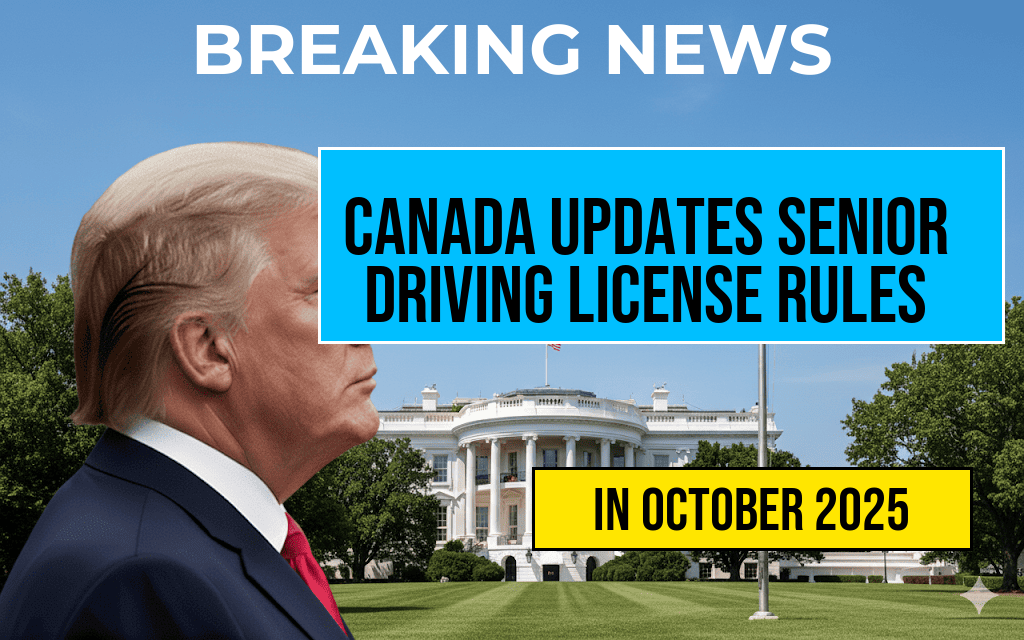Starting October 2025, Canada will introduce new driving license regulations specifically targeting drivers aged over 70, aiming to enhance road safety and ensure drivers’ fitness on the road. Under the updated framework, seniors in this age group will be required to undergo more frequent assessments of their driving abilities, including medical evaluations and practical testing. The federal government, alongside provincial transportation authorities, emphasizes that these measures are designed to balance independence with safety considerations, reflecting demographic shifts and increasing longevity among the population. The policy update follows extensive consultations with healthcare professionals, advocacy groups, and transportation safety experts, who agree that tailored assessments can better identify drivers who may need additional support or restrictions.
Details of the New Regulations
Mandatory Medical Examinations
Beginning in October 2025, drivers over 70 will be mandated to submit proof of health status through periodic medical reports. These evaluations will assess conditions such as cardiovascular health, vision, cognitive function, and mobility. The frequency of these reports will vary based on individual health histories but generally will be required every two years for most seniors. Medical reviews aim to identify potential impairments that could compromise driving safety, with healthcare providers playing a pivotal role in the process.
Enhanced Driving Tests
In addition to medical assessments, seniors will be subject to practical driving evaluations. These tests, conducted by certified driving examiners, will simulate real-world driving scenarios to gauge reaction times, decision-making skills, and vehicle control. The goal is to identify those who may need tailored support or restrictions, such as limiting driving to daylight hours or within certain geographic areas.
Renewal Process Adjustments
| Aspect | Pre-October 2025 | Post-October 2025 |
|---|---|---|
| Renewal Frequency | Every 5 years | Every 2 years |
| Medical Evaluation | Registered physicians at discretion | Mandatory and standardized |
| Driving Test | Optional for renewal | Mandatory for drivers over 70 |
Rationale and Public Response
Safety Concerns and Demographic Trends
Officials cite statistics indicating that older drivers are more susceptible to certain health-related impairments that could impair driving, such as slowed reaction times and visual decline. With Canada’s aging population—projected to reach nearly 25% of the total population by 2031, according to Statistics Canada—the need to adapt licensing procedures becomes increasingly urgent. The new rules aim to prevent accidents linked to age-related health issues without outright restricting seniors’ mobility.
Community and Advocacy Perspectives
Senior advocacy groups have expressed a mix of support and concern regarding the changes. While many agree that regular assessments could improve safety, some worry about potential stigmatization or loss of independence. “Our goal is to support seniors in maintaining their mobility safely,” said a spokesperson for the Canadian Association of Retired Persons. “Proper assessments can help seniors continue driving as long as they are fit, rather than forcing them to give up driving prematurely.” Conversely, some safety experts argue that these measures could lead to increased reliance on alternative transportation options, which might not be equally accessible in all regions.
Implementation and Support Measures
Training and Resources
To facilitate a smooth transition, provinces will provide resources including driver refresher courses tailored for seniors and informational campaigns emphasizing safe driving practices. Healthcare providers will also receive guidance on conducting age-appropriate assessments and communicating results effectively.
Accessibility and Accommodation
Recognizing the diverse needs of the senior population, authorities are exploring options such as mobile testing units and telehealth assessments for those with mobility challenges. Additionally, provinces are considering alternative transportation subsidies or programs to support seniors who may need to reduce or cease driving.
Potential Challenges and Future Outlook
Balancing Safety and Autonomy
While the regulations aim to reduce traffic incidents involving older drivers, they also raise questions about the impact on personal freedom and access. Critics warn that overly stringent requirements could inadvertently marginalize seniors, especially in rural or underserved communities where public transit options are limited.
Monitoring and Evaluation
The government plans to monitor the impact of these regulations over the first few years, assessing metrics such as crash rates, driver compliance, and feedback from seniors and healthcare providers. Adjustments will be made based on data to ensure that the policies remain effective and equitable.
As Canada navigates these changes, the focus remains on fostering a transportation system that prioritizes safety while respecting the independence of its aging population. Continued dialogue among policymakers, health professionals, and community groups will be key to refining these regulations in the years ahead.
Frequently Asked Questions
What are the key changes in the new driving license regulations for seniors over 70 in Canada?
The updated regulations require seniors over 70 years to undergo additional vision and health assessments periodically, along with more frequent license renewals to ensure they remain safe drivers.
When will the new driving license regulations for seniors come into effect?
The new regulations will be implemented starting October 2025, and seniors over 70 years will need to comply with the updated assessment and renewal procedures from that date onward.
How will the new regulations impact seniors over 70 who currently hold a driving license?
Seniors over 70 will be required to schedule regular health and vision tests and submit these assessments when renewing their licenses. They may also be asked to undertake additional driving evaluations if necessary.
What documents or assessments will seniors over 70 need to provide under the new regulations?
Seniors will need to provide medical reports from healthcare professionals, vision test results, and may need to complete driving skills assessments to demonstrate their ability to drive safely.
Where can seniors find more information or assistance regarding these new driving license regulations?
More information can be obtained from provincial transportation authorities or by visiting their official websites. Assistance and guidance are also available through licensed driving schools and healthcare providers.








